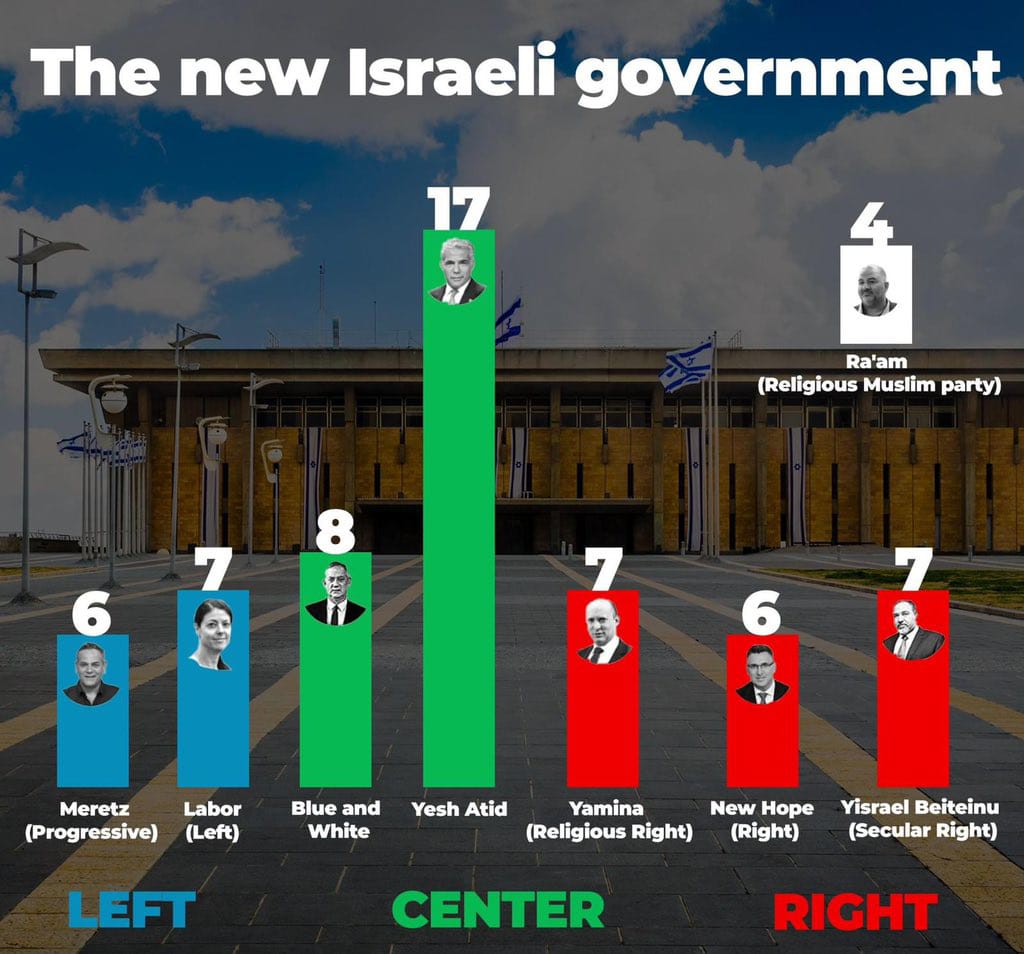
Listen to this article:
An Arab Islamist, a self-described “right-wing” religious Jew, and a centrist former newscaster walk into a Tel Aviv hotel around midnight. It sounds like the setup of a good (or bad) joke, but it is in fact the scene that created Israel’s new coalition government.
A quick note: Israel’s parliament, the Knesset, still needs to vote to approve the proposed ruling coalition. Approval is expected to happen as enough MPs have expressed a “yes” vote for the new government, but being Israel anything can happen. A vote may take place as early as Wednesday.
Who’s in, who’s out
A religious-nationalist. A former staunch secular TV presenter. A former Likud strongman. A Russian-immigrant. A former general. An openly gay man. A Palestinian Islamist. And a staunch feminist. This is Israel's next government. pic.twitter.com/ZQtRtFANo3
— Louis Fishman لوي فيشمان לואי פישמן (@Istanbultelaviv) June 6, 2021
The proposed ruling coalition is made up of eight parties, bringing them to the bare minimum threshold of 61 out of 120 seats needed in the Knesset to form a government. Of the eight, three political parties are getting the most attention:
- Yair Lapid’s Yesh Atid
- Naftali Bennet’s Yamina
- Mansour Abbas’ Ra’am
After Benjamin Netanyahu failed to put together enough seats to form a government (his party, Likud, secured 30 seats in the election) the task then fell to Lapid. Despite receiving fewer seats, Bennett will become prime minister first, a strategic move made by Lapid. Lapid will serve as foreign minister and then in two years as prime minister under the proposed power sharing agreement.
Most surprising of all is the ascendancy of Ra’am, the Islamist party, led by Mansour Abba, who are being called the kingmakers of Israeli politics. Their last minute support for the coalition pushed them to the finish line of 61 seats in the Knesset. (Former Defense Minister Avigdor Liberman’s secular right Yisrael Beiteinu party is also being credited for being the first right-wing political party to defect from Netanyahu’s bloc.)
Left out of the government are key Netanyahu supporters, including the Haredi religious parties. Netanyahu’s only hope to remain in power is to sway MPs to break with their parties (not impossible, but highly unlikely). If the vote in the Knesset fails to secure 61 votes, Israel is more than likely headed back to the polls for a fifth time in just 2 years.
The major players

Naftali Bennett, 49, is an observant, Modern Orthodox Jew. The son of immigrants from San Francisco, he was born in Haifa, served in two elite IDF commando units, and attended Hebrew University of Jerusalem. He made millions in developing anti-fraud software while living in New York City, and then moved back to Israel in 2006 in order to get into politics. He calls himself “right wing,” and was briefly head of a West Bank settler organization. A formerly close ally of Netayahu, he has served as his chief of staff, education minister, and defense minister.
Yair Lapid, 57, has been in politics since 2012 and started out as a popular journalist in Israel. The son of Israeli TV personality and politician Tommy Lapid, Lapid grew up in Tel Aviv and London and didn’t finish high school due to learning disabilities. Lapid is seen as Israel’s leading centrist politician, and his past positions include leader of the opposition, finance minister, and security cabinet minister.
Mansour Abbas, 47, is a devout Muslim from the northern Israeli town of Maghar, which has a majority Druze population. A relative newcomer to politics, Abbas made his political debut two years ago, when he was first elected to the Knesset. He studied dentistry at Hebrew University of Jerusalem, the same alma mater as Bennett. Ra’am is controversial in Israel due to their anti-Zionist, traditional Islamic-values first platform.
What does the new government stand for?
Pieced together from parties across the political spectrum, the one thing the coalition government is making clear is that they are not Likud or Netanyahu, Israel’s longest serving prime minister.
“After four elections and a further two months, it has been proven to all of us that there is simply no right-wing government possible that is headed by Netanyahu,” Bennett said in a speech on Sunday.
It will however take more glue than just “not being Netanyahu” to hold the fragile coalition government together because there are major differences amongst the eight participating parties. Take the Israeli-Palestinian conflict for example: Bennett completely opposes a two state solution, Lapid is in support of “two states for two peoples,” and Abbas’ Ra’am calls Zionism a “racist, occupier thought.”
A government of firsts
Despite their differences, this coalition government will be a government of many firsts. First, Bennett is religiously observant– he will be the first prime minister of the Jewish state to wear a kippah. Ra’am is the first Arab Islamist political party in Israeli history to be part of a ruling coalition. This is also the first government in which the candidate who received the mandate to form a government didn’t become prime minister first. Also, a record-breaking eight women will hold ministerial posts.
Who gets what

Almost every party made major concessions in order to piece together the coalition–the biggest one being Bennett serving as prime minister before Lapid, even though Lapid’s party, Yesh Atid, has more than double the number of seats in the Knesset than Yamina (Bennett’s party).
Ra’am also secured several concessions, including:
- An Arab politician in a cabinet post: regional cooperation minister
- Billions of dollars of economic aid for Arab areas of Israel
- Crackdown of crime in Arab areas
- Legalization of 3 Bedouin villages
- An agreement to discuss changing a controversial law which targets illegal Arab construction (the 2017 law is widely viewed by Arabs as discriminatory)
Under the coalition conditions Ra’am will not take part in security matter decisions.
Emotions running high
Emotions have been running high in Israel since the announcement of the proposed coalition government. Bennett said: “I told my kids that their father was going to be the most hated person in the country. But I explained that I was doing it for the sake of their country.”
Netanyahu has been campaigning hard to break the coalition, reportedly even personally reaching out to the rabbis of members of parliament to persuade them to vote against the government. Netanyahu’s chief talking point against the coalition is that it is a radical “dangerous left-wing” government, adding that it is the “greatest election fraud” in Israeli history.
“When we talk about a dangerous left-wing government, we’re talking about a government that will lose the Negev, a government that can’t resist US demands to freeze building in Judea and Samaria and also unfortunately Jerusalem,” he said. “It won’t resist the pressure … to rebuild an American consulate for Palestinians in the heart of Jerusalem and in doing so return the matter of dividing Jerusalem to the agenda.”
#Breaking: Shin Bet director Nadav Argaman: To safeguard the state's security & democratic order and institutions, I warn that the current discourse may be interpreted among certain groups or individuals, as permitting violent & illegal activities that may cause loss of life." pic.twitter.com/HSblDlu4CN
— Noga Tarnopolsky (@NTarnopolsky) June 5, 2021
In a joint letter, some of Israel’s top right-wing rabbis urged followers to “do everything” in order to prevent the new government from being formed. That letter earned a rare strong rebuke from Israel’s internal security service Shin Bet. Invoking the atmosphere in Israel that led up to the 1995 assassination of Prime Minister Yitzhak Rabin, the agency warned that the “extremely violent and inciting discourse” could “God forbid become lethal.”
In fact, in a first for Israel, Shin Bet has started to provide security for Bennett ahead of his formal appointment as prime minister. Other members of parliament have also asked for increased security after receiving threats.
What are people saying?
A poll conducted by Israel’s Channel 12 found that 46% of Israelis prefer the coalition government to a fifth election, while 38% would like to vote again (15% said they did not know).
According to this poll from Channel 12, Israelis support the Lapid – Bennett Cabinet and trust more Naftali Bennett than Bibi. However, the idea of an Arab party in the Coalition does not get the support of all the population.
— Samuel Sabbah (@Samuel_Sabbah) June 6, 2021
The sample dissaproves of Katz as next Likud Leader. pic.twitter.com/Tr7xOAlVEC
“Let go. Let the country move forward. People are allowed to vote for a government even if you do not lead it — a government that, by the way, is 10 degrees to the right of the current one. Don’t leave scorched earth in your wake. We want to remember the good, the great deal of good you did during your service [as prime minister], and not, God forbid, a negative atmosphere you would leave upon your departure,” Naftali Bennett addressing Prime Minister Benjamin Netanyahu in a nationwide speech.
“But you’ll discover that this government isn’t being created against you. It will work for you, it will respect you, it will be your government as well. It will also be a government of those who voted for Likud, Shas, United Torah Judaism and Religious Zionism. They’ll discover that we’ll be fair toward them, that we will respect their beliefs and opinions, that we’ll listen to their needs,” Yair Lapid.
“A government based on abysmal hatred is about to be formed, not only toward the prime minister but toward all the values we stand for. This is a government that will be helpless vis-à-vis Iran and will stop the settlement in Judea and Samaria,” Knesset Speaker Yariv Levin of Likud.
“We have reached a critical mass of agreements in various fields that serves the interest of Arab society and that provide solutions for the burning issues in Arab society — planning, the housing crisis, and of course, fighting violence and organized crime,” Mansour Abbas.
American evangelical leader and Netanyahu advocate Mike Evans wrote in a letter to Bennett: “You’re a pathetic, bitter little man so obsessed on murdering Netanyahu that you’re willing to damage the State of Israel for your worthless cause.” He said Bennett’s government would lose all support from the U.S. evangelical community.
What does this mean for the diaspora, religious matters?

Both Bennett and Lapid appear to favor less religious control by the Haredi rabbinate. Bennett, though observant, is more liberal than his Orthodox partners; in 2018, Israel’s chief rabbi slammed Bennett for visiting a Conservative school, and Bennett has also publicly called out Israel’s chief rabbinate on matters, including conversion and pluralistic prayer.
Lapid, who is not observant, strongly supports taking away the chief rabbinate’s control of marriage, recognition of all forms of Judaism, pluralistic prayer at the Western Wall, and public transportation on Shabbat.
One thing we should expect is an increased focus on diaspora relations and outreach. In 2018, then as education minister, Bennett said the following: “If there is one thing that keeps me up at night, it’s not Iran, it’s the future of the Jewish people in the diaspora. If we don’t act soon, we’re going to be losing millions of Jews to assimilation.”
Both Lapid and Bennett favor renewing the focus on relations with U.S. Jewry.
“I think this is one of the greatest challenges of our generation. It’s got to be at the top of our list. There’s an Atlantic-Jewish chasm growing between Israelis and Jews in the United States,” Bennett has said. “The Israeli population is gradually going more rightward and becoming more traditionally Jewish, whereas American Judaism is more left and liberal. That’s a fact. I don’t know how to whitewash that, but it should not be a reason to fall apart.”
Meanwhile Lapid has been asking for U.S. Jews to be patient. In 2017, addressing Reform and Conservative rabbis, he asked them to “not give up on us. We have no intention of giving up on you. We are one people. It might take time. It might take elections. But in a democracy, the majority decides, and the majority in Israel want us to be one nation.”
The Bottom Line
“The time to say it’s for real will only be when that vote is cast and the votes have been counted and Netanyahu is no longer leading the coalition,” Times of Israel’s editor David Horovitz said on the news outlet’s podcast on Sunday. “We’re not there yet, we’re apparently very close to it but we’re not there yet.”
Despite it appearing that Netanyahu is out of power and Israel is about to embark on a historic, coalition government the political drama is far from over. We can expect the political wrangling to go down to the wire, much like the 11th hour deal that was pieced together to make this government come together.
This coalition is extremely fragile, and so far the only substance that has come from the new government is the promise that they are not Netanyahu. Time will tell if that’s enough to hold the eight parties together over the next couple of months.
“I never did anything alone. Whatever was accomplished in this country was accomplished collectively,” Golda Meir.
Democracy isn’t pretty at times, but one thing this political process has shown us, it is possible to bring people from all parts of life and society together. We will see how and if they’re able to govern together.
Originally Published Jun 8, 2021 12:02AM EDT
